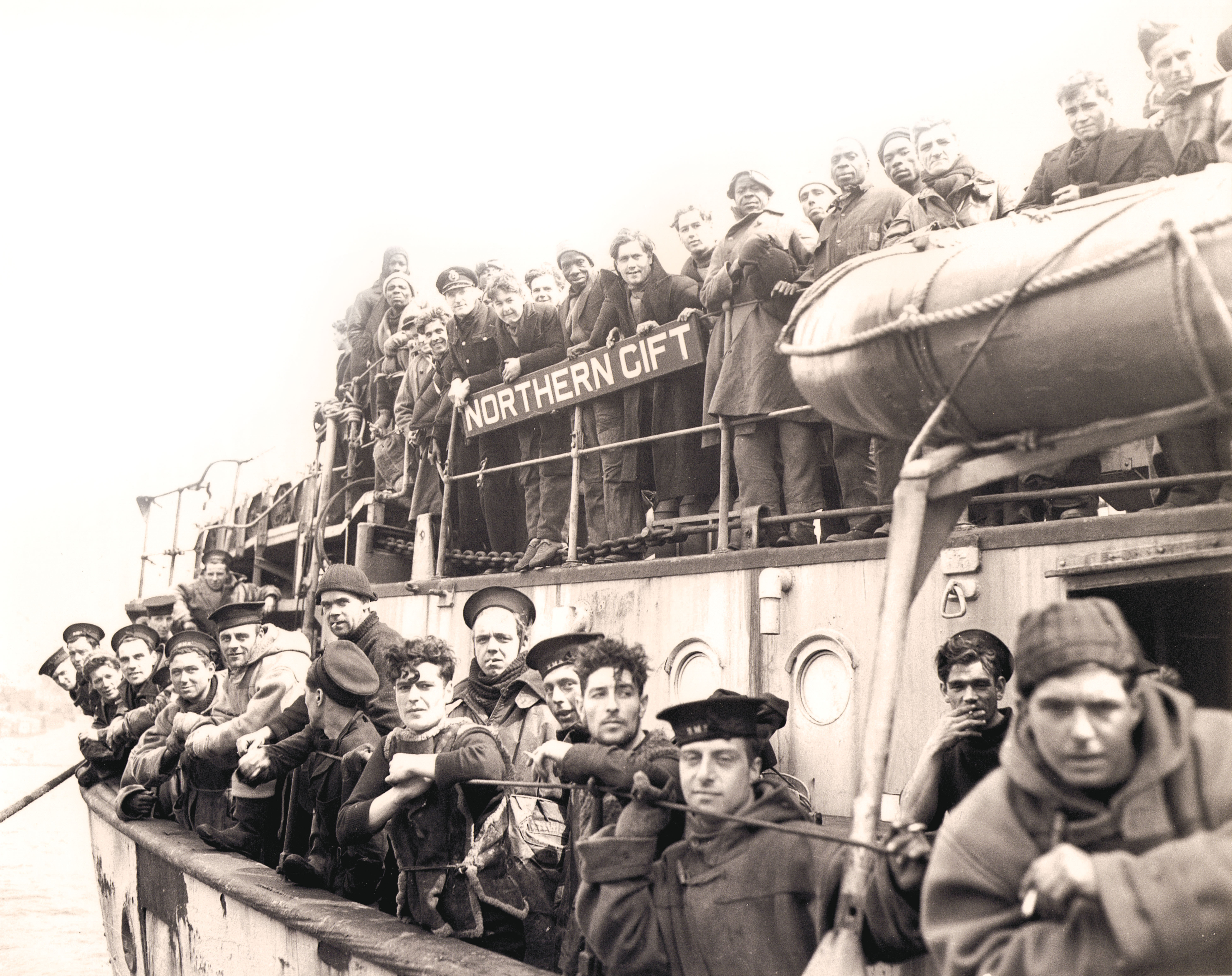
Survivors of two merchant ships crowd the decks of a rescue trawler in St. John’s in April 1943. [GERALD M. MOSES, LIBRARY AND ARCHIVES CANADA—PA153052]
A week before war was declared, the Royal Canadian Navy took control of merchant shipping. Canada declared war on Sept. 10, 1939, and on Sept. 16, a convoy left from Halifax, the first of 380 from Canada during the war. As 1939 closed, 25 convoys comprised of 527 ships had crossed the Atlantic, with only one lost by U-boat attack, another by collision and two to mines.
That changed quickly. The summer and fall of 1940 was the “happy time” for U-boats, when they roamed the east coast of North America, picking off ships often within sight of land. That fall they began attacking in groups called wolf packs. Eighty-eight per cent of casualties among Canada’s merchant sailors occurred before 1943. After that, the Allies’ anti-submarine strategies began to turn the tide of the sea war.
About 12,000 Canadians served in Canada’s merchant navy and under the flags of many other Allied nations. The merchant navy was a beacon for those unable to join other services, particularly those turned down for being too young or too old.
About 1,600 Canadian merchant sailors, or about 13 per cent, did not survive the war, a higher proportion than the army, navy or air force, which had combined losses of less than four per cent.
Merchant sailors lived in constant fear of danger, around the clock, year in and year out, knowing their chances were slim if they had to abandon ship. Less than 50 per cent of crew who went into the water were rescued.
“We never had any protection or anything, not in those days…we were slaughtered,” recalled Jim Boutiler, who signed up when he was 15 and was aboard the MV Montrolite when it was torpedoed twice on Feb. 4, 1942. “We were in the lifeboat about three days, rough weather all the time…It was just like a nightmare.”
It took the SS Rose Castle about 90 seconds to sink after being struck by a second torpedo on Nov. 2, 1942, sucking under Gordon Hardy of Ingonish, N.S. He surfaced in pitch dark in frigid water, buffeted by snow and wind. “I could hear the people calling to God and the Virgin Mary around me in the dark. I was in the water at least a couple of hours and I came across a life raft,” he said.
He was pulled aboard and could no longer stand by the time a rescuer hauled him off the raft. “He locked both hands on my wrists,” he said in a Memory Project interview. “And that was the greatest feeling that I ever felt. I knew I was going to make it.”
“Every time you went out you never knew if you were coming back,” said Jack Matthews of Dartmouth, N.S., one of 50 merchant sailors to tell their stories in Running the Gauntlet by Mike Parker. “I never took my life jacket off. I slept with it.”
By war’s end, German U-boats had sunk nearly 3,000 Allied vessels—2,845 of them merchant ships.
Despite the risks, many merchant mariners signed up again after their two-year stints or after surviving the sinking of their ships. Steward Allan Harvie survived nine different torpedo attacks; twice he was the only survivor, once, one of only two of a crew of 55 to come out alive. When a torpedo hit the explosives-laden ship, he and the cook were saved because they were in the icebox at the time. “Saved by bacon and eggs!” he said later in a Star Weekly article.
Yet when the war ended, merchant mariners were not recognized as veterans.
“The only regrets I ever had was the rotten deal that we did get,” said Boutiler. Not only did they not get veterans’ benefits as those who served in the army, navy and air force, but retired navy personnel were ahead of them in the line for jobs and promotions in the merchant fleets after the war. “Well, how about my experience in the merchant navy? ‘Oh no, that don’t count.’ They owe us a lot, but we’ll never get it.”
In 1992, nearly half a century after the war ended, during which time thousands had died, former merchant mariners were finally granted official status as veterans, eligible to receive disability pensions, allowances and health-care benefits available to other armed-forces veterans. But nothing was done to compensate them retroactively for benefits dating back to 1945.
A hunger strike by four merchant navy veterans in 1998 turned the tide. In 2000, the federal government began awarding compensation back to the end of the war.
In 2003, Parliament declared Sept. 3 Merchant Navy Veterans Day and ceremonies are now held across the country honouring the service and sacrifice of Canada’s other navy.
Advertisement





















